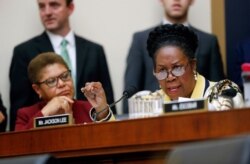House Democrats will vote on two articles of impeachment early next week, charging President Donald Trump with abuse of power and obstruction of Congress — two offenses they say should remove him from office under the standards laid down by the U.S. Constitution.
Trump is the third president in history to face impeachment based on a specific charge that he abused the power of his office. The Constitution does not directly mention abuse of power among the reasons that Congress can impeach a president. Instead, "treason, bribery and high crimes and misdemeanors" are listed.
Democratic lawmakers, legal experts and precedent support the approach.
Trump has said he did nothing wrong and that House Democrats' allegations are "flimsy, pathetic, ridiculous articles of impeachment."
What do the articles of impeachment say about Trump's abuse of power?
The abuse of power charge is centered on the allegation that Trump predicated the release of $391 million of congressionally approved military aid to Ukraine and a White House meeting for Ukrainian President Volodymyr Zelenskiy upon an announcement by Ukraine that Joe Biden, a potential 2020 election rival of Trump, and Biden’s son Hunter would be investigated.
"President Trump engaged in this scheme or course of conduct for corrupt purposes in pursuit of political benefit," said the first article of impeachment introduced Tuesday by House Democrats. "In so doing, President Trump used the powers of the presidency in a manner that compromised the national security of the United States and undermined the integrity of the United States democratic process. He thus ignored and injured the interests of the nation."
Why would 'abuse of power' fall under 'high crimes and misdemeanors?'
While the framers of the Constitution did not specifically mention abuse of power as an impeachable offense, House Democrats argued this week that Congress was given the power to remove presidents from office for this very kind of conduct.
"The framers of the Constitution recognized that someday a president might come to office who would have used that office, betrayed the public trust and undermined national security to secure foreign help in his reelection," House Intelligence Committee Chairman Adam Schiff of California said Tuesday while introducing the articles of impeachment. "They recognized this danger, and they prescribed a remedy, and that remedy is impeachment."
Some experts say the fact that the aid to Ukraine was approved by another branch of the U.S. government makes this a clear-cut case of abuse of power.
"He really had no say constitutionally on whether it should be given to Ukraine. Right there, he's in violation of constitutional norms and practices and the law," said Barbara Ann Perry, presidential studies director at the University of Virginia's Miller Center. Perry said Trump further abused the power of the presidency by tying the holdup in aid to an investigation into his political rivals.
How do the charges against Trump compare with charges against past presidents?
Lawmakers in previous impeachments have used the broad outlines of "high crimes and misdemeanors" to include charges of abuse of power against presidents.
"The central kind of problem that impeachment is directed toward is that somebody who achieves the status of president, and then instead of using that power for the American people and to take care that the laws are faithfully executed, uses it for illicit purposes," said Louis Michael Seidman, professor of constitutional law at Georgetown University Law Center. "That's a theme that runs through all presidential impeachments."
President Bill Clinton faced four articles of impeachment in December 1998, but the charge that he abused the power of his office while covering up an affair with White House intern Monica Lewinsky did not pass in the House of Representatives.
In August 1974, President Richard Nixon resigned rather than face a vote on articles of impeachment in the House, including a charge he abused the power of his office by directing government agencies to target citizens with investigations.
President Andrew Johnson was impeached in 1868 for multiple offenses related to his use of executive powers. But he did not face a specific charge of abuse of power.
Why do House Democrats believe Trump's dealings with Ukraine constitute an abuse of power?
Trump's conduct "strikes at the heart of our democracy — the ability of people to elect their own leaders," Representative David Cicilline of Rhode Island, head of the House Democrats' communications arm, told reporters Tuesday. "There's no higher crime than dragging a foreign government in to corrupt our elections."
Trump is the first president to face impeachment charges related to an alleged abuse of power in foreign affairs. Cicilline said the framers of the Constitution were concerned about precisely this kind of situation when they developed the remedy of impeachment.
"This is the president of the United States soliciting a foreign government to corrupt our elections and undermine our democracy. It undermined our national security," Cicilline said.
Representative Sheila Jackson Lee of Texas, a member of the House Judiciary Committee that wrote the articles of impeachment, said Tuesday that lawmakers' actions "distinguish America from every other country. That is that no one is above the law."
Lee said her committee "looked very keenly at the question of abuse of power, which, if we begin to not mind holding presidents accountable, it sends America down a spiraling path of being like every other country that has had its challenges with leadership. It clearly denotes that we have a president and not a monarch," Lee said.
When the full House votes next week, lawmakers will also consider if Trump should be removed from office for obstructing Congress' investigation into potential abuses of power. If one or both of the articles are adopted, the Senate will hold a trial early next year to consider if Trump should be removed from office.
Jesse Oni contributed to this report.







